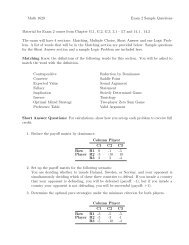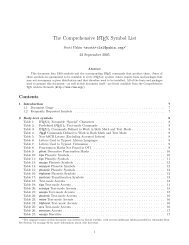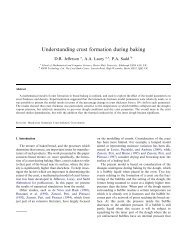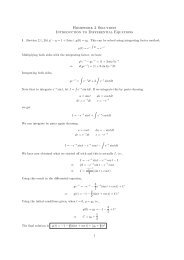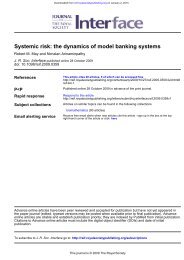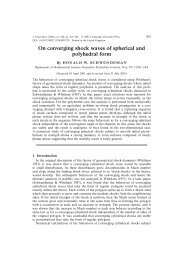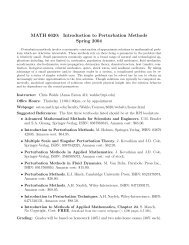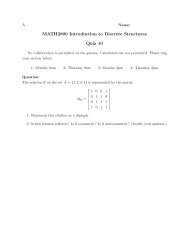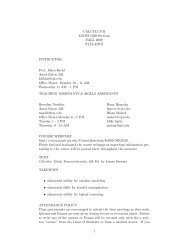ILOG CPLEX C++ API 9.0 Reference Manual
ILOG CPLEX C++ API 9.0 Reference Manual
ILOG CPLEX C++ API 9.0 Reference Manual
You also want an ePaper? Increase the reach of your titles
YUMPU automatically turns print PDFs into web optimized ePapers that Google loves.
IloCplex<br />
to use for the constraint rngs[i] in order to make the model feasible. Similarly,<br />
varlb[i] and varub[i] contain the lower and upper bound to use for variable<br />
vars[i] in order to make the model feasible. If bounds were not allowed to be relaxed<br />
or did not need to be relaxed in order to make the model feasible, the original bounds<br />
are returned.<br />
The active model is not changed by this method.<br />
If feasOpt successfully finds a relaxation that made the model feasible, it also<br />
installs a solution vector that would be feasible, had the model been relaxed as specified<br />
with the returned relaxed bounds. This solution can be queried with the conventional<br />
query methods.<br />
When the optind parameter is IloTrue, this method also tries to find the optimal<br />
solution of the minimally relaxed model. That is, it finds the solution that is optimal<br />
with respect to the original objective function, but requires only minimal relaxation.<br />
With the default setting of the parameter optind the original objective funciton is not<br />
evaluated.<br />
public void freePresolve()<br />
This method frees the presolved problem. Under the default setting of parameter<br />
Reduce, the presolved problem is freed when an optimal solution is found; however, it<br />
is not freed if Reduce has been set to 1 (primal reductions) or to 2 (dual reductions). In<br />
these instances, the function freePresolve can be used when necessary to free it<br />
manually.<br />
public IloCplex::Algorithm getAlgorithm()<br />
This method returns the algorithm type that was used to solve the most recent model in<br />
cases where it was not a MIP.<br />
public void getAX(IloNumArray val,<br />
const IloRangeArray con)<br />
For the constraints in con, this method places the values of the expressions, or,<br />
equivalently, the activity levels of the constraints for the current solution of the invoking<br />
IloCplex object into the array val. Array val is resized to the same size as array<br />
con, and val[i] will contain the slack value for constraint con[i]. All ranges in<br />
con must be part of the extracted model.<br />
public IloNum getAX(const IloRange range)<br />
This method returns the value of the expression of constraint range, or, equivalently,<br />
its activity level, for the current solution of the invoking IloCplex object. The<br />
range must be part of the extracted model.<br />
public IloCplex::BasisStatus getBasisStatus(const IloConstraint con)<br />
This method returns the basis status of the implicit slack or artificial variable created for<br />
the constraint con.<br />
<strong>ILOG</strong> <strong>CPLEX</strong> <strong>C++</strong> <strong>API</strong> <strong>9.0</strong> REFERENCE M ANUAL 58


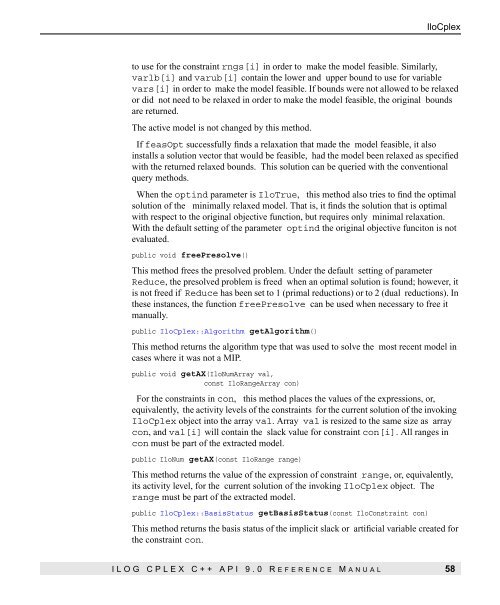
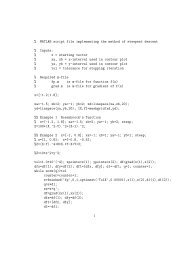

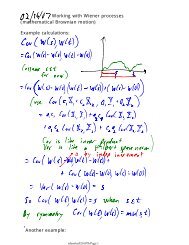

![MATH 1500 Sample Questions Exam 2 1. [3.7] A 10-ft plank is ...](https://img.yumpu.com/43861920/1/190x245/math-1500-sample-questions-exam-2-1-37-a-10-ft-plank-is-.jpg?quality=85)
